
Find Help
More Items From Ergsy search
-

How do health officials monitor West Nile Virus?
Relevance: 100%
-
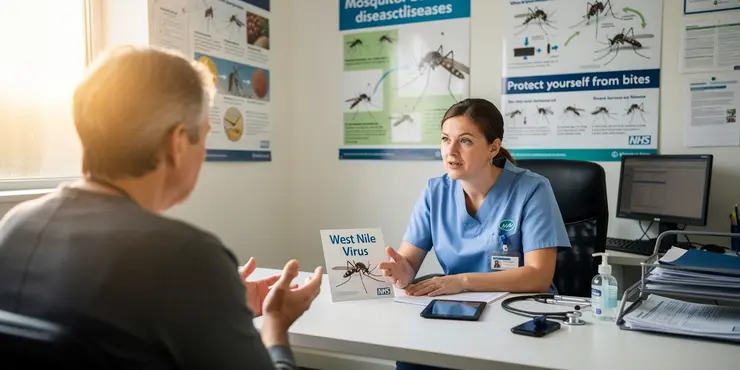
What is West Nile Virus?
Relevance: 74%
-

What is West Nile Virus?
Relevance: 74%
-

Is there a vaccine for West Nile Virus?
Relevance: 71%
-
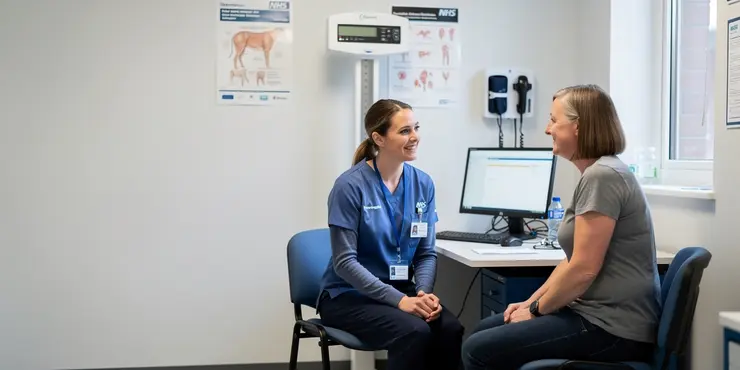
How prevalent is West Nile virus in the UK?
Relevance: 70%
-

Is there a test for West Nile Virus?
Relevance: 70%
-
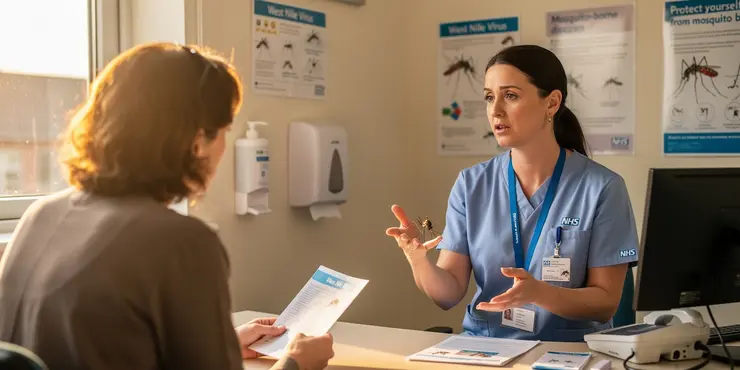
How is West Nile Virus transmitted?
Relevance: 69%
-

Are there treatments for West Nile Virus?
Relevance: 69%
-
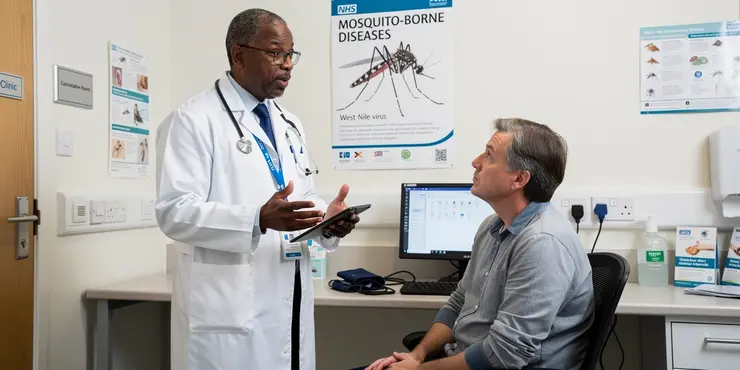
Which countries are affected by West Nile Virus?
Relevance: 67%
-

What are the symptoms of West Nile Virus?
Relevance: 66%
-

Can pets get West Nile Virus?
Relevance: 66%
-

What should I do if I think I have West Nile Virus?
Relevance: 63%
-

Who is at risk for severe illness from West Nile Virus?
Relevance: 61%
-
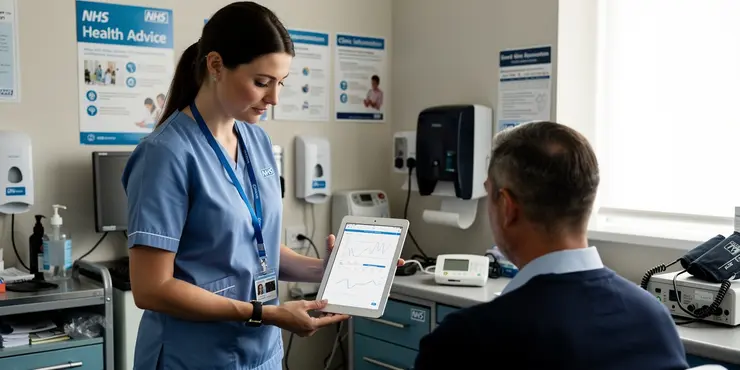
How do health officials monitor H3N2 activity?
Relevance: 45%
-

Can mosquitoes carrying West Nile Virus be controlled?
Relevance: 44%
-
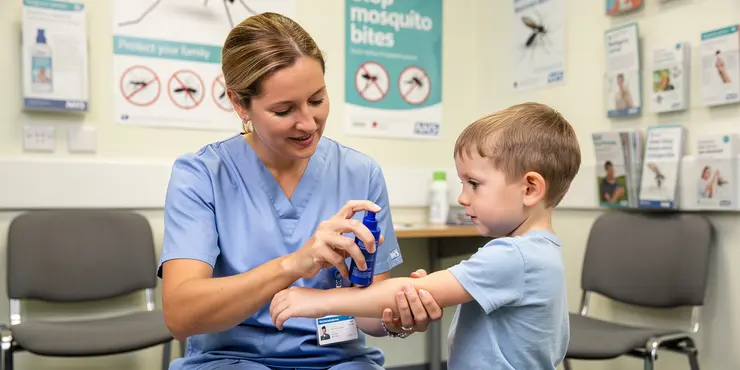
How can West Nile Virus be prevented?
Relevance: 44%
-

Can you get West Nile Virus more than once?
Relevance: 40%
-

What other viruses are tested for in blood donations?
Relevance: 36%
-

What diseases are spread by mosquitos in the UK in 2025?
Relevance: 32%
-

Are UK mosquitoes capable of transmitting Zika virus?
Relevance: 32%
-

When is West Nile Virus most active?
Relevance: 28%
-

Is the Marburg virus related to the Ebola virus?
Relevance: 26%
-

How do health authorities confirm a Marburg virus outbreak?
Relevance: 26%
-
Do all mosquitoes in the UK carry diseases?
Relevance: 25%
-

Can West Nile Virus be transmitted from person to person?
Relevance: 24%
-

West Midlands LEHN Animated Video on Eye Health
Relevance: 23%
-
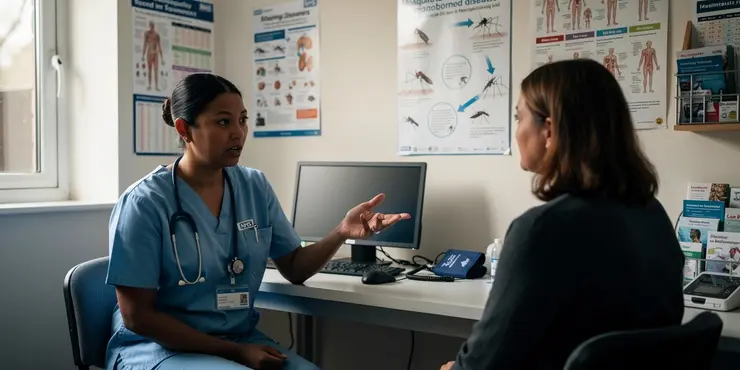
What regions of the UK are most affected by mosquito-borne diseases?
Relevance: 23%
-

What is the Ebola virus?
Relevance: 23%
-

Health Officials Warn Against 'DIY' Health Remedies Amid Supply Chain Issues
Relevance: 23%
-

Is Zika virus present in the UK?
Relevance: 23%
-

Why are Nipah Virus outbreaks considered a public health concern?
Relevance: 22%
-
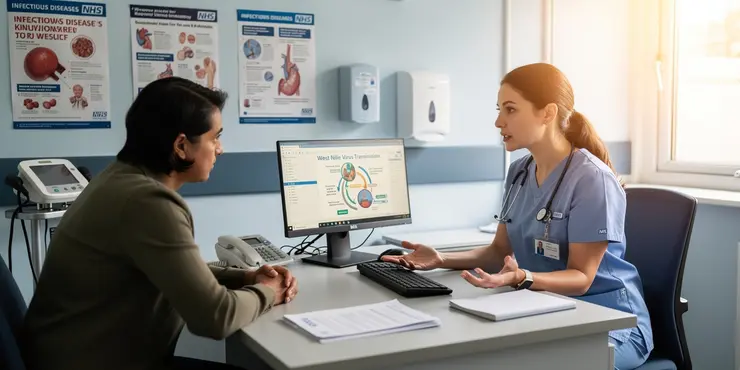
Can West Nile Virus spread through blood transfusions or organ transplants?
Relevance: 22%
-

Is there a season when mosquito-borne diseases are more likely in the UK?
Relevance: 21%
-

How long is the incubation period for the Marburg virus?
Relevance: 20%
-

Why is regular health monitoring important for drivers over 70?
Relevance: 20%
-

Where can I find the latest updates on Zika virus risk areas?
Relevance: 20%
-

Does the UK have Zika virus?
Relevance: 20%
-

Is there a cure for Nipah Virus?
Relevance: 20%
-

Do all mutations in the virus lead to new variants?
Relevance: 19%
-

Are the Nimbus and Stratus variants officially recognized?
Relevance: 19%
Introduction
West Nile Virus (WNV) is a vector-borne disease primarily transmitted through the bite of an infected mosquito. Health officials around the world, including in the UK, monitor this virus due to its potential impact on human and animal health. Understanding how health officials track and manage WNV outbreaks is crucial for disease prevention and control.
Surveillance of Mosquito Populations
One of the primary methods health officials use to monitor West Nile Virus is through the surveillance of mosquito populations. In the UK, public health authorities collaborate with entomologists to collect and test mosquitoes for the presence of WNV. This often involves setting mosquito traps in strategic locations, especially areas with standing water where mosquitoes are likely to breed. By analysing mosquito samples, officials can detect the virus before it spreads to humans or animals.
Monitoring Bird Populations
Birds, particularly certain species such as crows and jays, are significant hosts for the West Nile Virus. Health officials monitor bird populations, looking for unusually high numbers of bird deaths, which can indicate the presence of WNV in the area. Carcasses of dead birds may be collected and tested to confirm if WNV is the cause. This form of surveillance acts as an early warning system, indicating potential risks to human and animal populations.
Human Case Reporting
Although human cases of West Nile Virus are rare in the UK, health officials still place emphasis on monitoring and reporting such cases. Medical practitioners are required to report any suspected cases of WNV to public health authorities. Laboratory testing can confirm diagnosis, and once a case is identified, epidemiologists work to determine the source and any possible links to other cases. This helps in understanding the spread and mitigating future outbreaks.
Public Health Campaigns
Health officials also engage in public health campaigns to raise awareness about West Nile Virus and preventive measures. These campaigns may include educational materials on how to avoid mosquito bites, such as using insect repellent, wearing protective clothing, and eliminating mosquito breeding sites around homes. Public awareness is crucial in reducing the chances of virus transmission and ensuring that communities are informed and proactive.
Conclusion
In the UK, a combination of mosquito and bird surveillance, human case reporting, and public health campaigns form the backbone of West Nile Virus monitoring. Although the virus is not currently a major concern in the UK, ongoing vigilance by health officials helps prevent potential outbreaks. Through a coordinated effort, public health authorities strive to protect both human and animal populations from the risks posed by West Nile Virus.
Introduction
West Nile Virus (WNV) is a disease that you can get from a mosquito bite. Mosquitoes are tiny flying insects that can carry the virus. Health workers in many parts of the world, including the UK, keep an eye on this virus to keep people and animals safe. It is important to know how they watch and control the virus to stop it from spreading.
Watching Mosquitoes
One way health workers look out for West Nile Virus is by watching mosquito numbers. In the UK, health experts work with scientists who study bugs to collect and test mosquitoes to see if they have the virus. They often use traps in places like ponds or puddles, where mosquitoes lay eggs. By checking these mosquitoes, experts can find the virus early, before it affects people or animals.
Keeping an Eye on Birds
Some birds, like crows and jays, can carry West Nile Virus. Health workers look for lots of dead birds in an area, which might mean the virus is around. They can collect these birds to test if the virus is the reason they died. This helps to know if the virus might spread to humans and animals.
Reporting Human Cases
Even though people in the UK don’t often get West Nile Virus, health workers still watch for it. Doctors must tell health officials if they think someone has WNV. Tests in labs can find out if a person really has it. If someone is sick with WNV, experts study how they might have caught it to stop it from spreading to others.
Educating the Public
Health workers tell people about West Nile Virus and how to stay safe. They may give tips on avoiding mosquito bites, like using bug spray, wearing long sleeves, and getting rid of standing water near homes. Teaching people helps them stay safe and stops the virus from spreading.
Conclusion
In the UK, watching mosquitoes and birds, reporting human cases, and teaching the public are key ways to keep an eye on West Nile Virus. Even though the virus isn’t a big worry in the UK right now, health workers stay alert to prevent any outbreaks. Through working together, health officials aim to keep everyone safe from West Nile Virus.
Frequently Asked Questions
What methods do health officials use to monitor West Nile Virus?
Health officials use a variety of methods including surveillance of mosquito populations, testing of dead birds, human case tracking, and monitoring environmental conditions.
How do officials track mosquito populations for West Nile Virus?
Officials set mosquito traps to collect samples which are then tested for the presence of West Nile Virus.
Why do health officials test dead birds for West Nile Virus?
Birds are often carriers of West Nile Virus, and testing dead birds can indicate the presence of the virus in an area.
How are human cases of West Nile Virus monitored?
Human cases are tracked through healthcare facility reporting systems and monitored for any outbreaks.
What role does environmental monitoring play in West Nile Virus surveillance?
Environmental monitoring, such as temperature and rainfall data, helps predict mosquito breeding conditions and potential virus spread.
Do health officials use predictive models for West Nile Virus?
Yes, predictive modeling is used to identify areas at risk for outbreaks based on various factors such as climate and mosquito population dynamics.
How often are mosquito samples tested for West Nile Virus?
Mosquito samples are typically tested weekly during peak mosquito breeding seasons.
What technologies assist in monitoring West Nile Virus?
GIS mapping, statistical software, and genetic sequencing technologies are used to monitor and analyze West Nile Virus data.
How do officials respond to detected West Nile Virus activity?
Responses may include public health notifications, increased mosquito control measures, and recommendations for personal protection.
What is the role of public education in West Nile Virus monitoring?
Public education helps communities understand the risks and prevention methods for West Nile Virus, aiding in overall control efforts.
How do health officials confirm West Nile Virus in laboratory tests?
Health officials confirm West Nile Virus through tests such as PCR (Polymerase Chain Reaction) and serology in certified laboratories.
Do officials coordinate with other agencies for West Nile Virus monitoring?
Yes, officials often coordinate with other local, state, and federal agencies for comprehensive monitoring and response efforts.
Are there specific risk factors used in monitoring West Nile Virus?
Risk factors include large mosquito populations, presence of bird carriers, and favorable environmental conditions such as warm weather.
How is data from West Nile Virus monitoring shared with the public?
Data is often shared through public health websites, press releases, and community alerts to keep the public informed.
Can West Nile Virus surveillance be used to monitor other mosquito-borne diseases?
Yes, the surveillance techniques and infrastructure can often be adapted to monitor other mosquito-borne diseases.
What role do healthcare providers play in monitoring West Nile Virus?
Healthcare providers report suspected cases to health departments, contributing to surveillance data.
How is volunteer reporting of dead birds used in West Nile Virus monitoring?
Volunteers and the public can report dead birds to local health departments, which helps in locating potential virus hotspots.
What types of mosquito traps are used in West Nile Virus monitoring?
Common traps include CO2-baited traps and gravid traps, which attract and capture different species of mosquitoes for testing.
How do changes in weather patterns affect West Nile Virus monitoring?
Changes such as increased rainfall and higher temperatures can lead to higher mosquito populations, requiring more intensive monitoring.
Is there a national database for tracking West Nile Virus cases?
Yes, data on West Nile Virus cases and surveillance is often compiled into national databases for tracking and research purposes.
How do health workers check for West Nile Virus?
Health workers use different ways to check for West Nile Virus.
- Look for Sick Animals: Health workers watch birds and horses to see if they get sick.
- Test Mosquitoes: They catch and test mosquitoes to check for the virus.
- Check People: Doctors report cases of West Nile Virus in people to health workers.
People can use pictures and videos to understand how health workers do these checks. Talking to a doctor or nurse can also help.
Health workers use lots of ways to keep track of West Nile virus. They watch mosquitoes, test dead birds, keep track of sick people, and check the weather.
How do people check mosquitoes for West Nile Virus?
Scientists look for mosquitoes to see if they carry a sickness called West Nile Virus.
Here is how they do it:
- They set up traps to catch mosquitoes.
- They count how many mosquitoes they catch.
- They check the mosquitoes to see if they have the virus.
Tools that can help:
- Pictures or videos of mosquitoes and traps.
- A helper to read the information out loud.
- Easy-to-read charts and graphs.
Officials put out special traps to catch mosquitoes. They do this to collect bugs and check if they have West Nile Virus.
Why do health workers check dead birds for West Nile Virus?
Sometimes, birds can get sick from a virus called West Nile. Health workers look at dead birds to see if they had this virus. This helps them know if the virus is in the area and if it might make people sick too.
Ways to understand better:
- Ask someone to explain the words you don't know.
- Look at pictures of health workers checking birds.
- Use simple videos to learn more about West Nile Virus.
Sometimes birds have a sickness called West Nile Virus. If a bird has died, testing it can show if the sickness is in the area.
How do we keep track of people who get West Nile Virus?
Scientists and doctors check how many people get sick from West Nile Virus.
They use different ways to watch and understand how the virus spreads.
Here are some tips to help understand:
- Use pictures or diagrams to explain.
- Ask someone to read aloud to you.
- Use online tools that make text easier to read.
Doctors and nurses tell others about people who are sick. They watch for more people getting sick to know if there is a problem.
How does checking the environment help us watch for West Nile Virus?
Watching the weather, like checking how hot or rainy it is, helps us know when mosquitoes might lay eggs and spread viruses.
Do health workers use special tools to predict West Nile Virus?
Health workers have tools that help them guess where West Nile Virus might happen. These tools are like a crystal ball but for health! They look at things like weather and mosquito numbers.
Helpful Tips:
- Use pictures and charts to understand the information better.
- Ask a grown-up or teacher if you have questions.
- Use websites that read the text out loud if reading is hard.
Yes, we can use special tools to guess where sickness might spread. These tools look at things like the weather and how many mosquitoes there are.
How often do scientists check mosquitoes for West Nile Virus?
Scientists check mosquitoes to see if they have the West Nile Virus. They do these tests regularly to keep people safe.
If you or someone you know finds reading hard, here are some tips:
- Read slowly and take your time.
- Use a dictionary to look up words you don't know.
- Ask someone to read with you.
We usually test mosquito samples every week when there are lots of mosquitoes being born.
What tools help us watch out for West Nile Virus?
We use special tools to see where West Nile Virus is. These can be simple or high-tech. They help us find the virus and keep people safe.
Examples of Helpful Tools:
- Maps: Show where the virus is.
- Traps: Catch mosquitoes to test them.
- Computers: Help us look at lots of information.
If you're learning about this, try using pictures or videos. They can help make things clearer.
We use special tools and computers to watch and study the West Nile Virus.
These tools help us see where the virus is, count how much there is, and look at its tiny parts.
You might find it helpful to use picture dictionaries or voice-to-text apps to understand more about topics like this.
What do officials do when they find West Nile Virus?
The answers might include ways to keep the community safe, like sending out health warnings, doing more to stop mosquitoes, and giving advice on how to stay safe.
What does public education do to help watch for West Nile Virus?
Public education teaches people about West Nile Virus.
It helps everyone learn how to stay safe from the virus.
This way, people know what signs to look for.
They can tell others if they see something about the virus.
Use simple pictures and easy words to help understand.
Ask questions if you need more help.
Public education helps people learn about the risks of West Nile Virus and how to prevent it. This helps keep everyone safe.
How do health workers find West Nile Virus in lab tests?
Health workers use tests in a lab to find the West Nile Virus. Here is how they do it:
1. Taking Samples: They take a small sample of blood or a bit of spinal fluid from a person.
2. Testing for Virus: In the lab, they look for signs of the virus in the sample.
3. Using Special Tools: They use special tools, like a microscope, to see if the virus is there.
Helpful Hint: If this seems hard to follow, ask someone to help you understand step by step.
Health officials check for West Nile Virus using special tests in labs. Some tests they use are called PCR and serology.
Do workers talk to other groups to watch for West Nile Virus?
Yes, officials usually work together with other local, state, and national groups to watch and respond to things that happen.
What things do we look for to check for West Nile Virus?
Things that can raise the risk are lots of mosquitoes, birds that can carry the disease, and warm weather.
How do we tell people about West Nile Virus data?
People share information on health websites, news from the press, and notices for everyone. This helps everyone know what is happening with health news.
Can checking for West Nile Virus help find other diseases from mosquitoes?
Yes, we can use the same tools and systems to watch out for other diseases spread by mosquitoes.
How do doctors and nurses help watch for West Nile Virus?
Doctors and nurses help keep people safe from West Nile Virus. They look for signs of the virus in people. They tell people how to stay safe from mosquito bites. They also report cases to health experts. If you need help, talk to your doctor or nurse.
Doctors and nurses tell health departments if they think someone might be sick. This helps health departments keep track of illnesses.
How do people help watch for West Nile Virus by telling about dead birds?
If you see a dead bird, you can tell your local health department. This helps them find places where a virus might be spreading.
What mosquito traps are used to check for West Nile Virus?
Mosquito traps help us see if there are mosquitoes with West Nile Virus.
Here are some types of traps:
- Light Traps: These traps use lights to pull in mosquitoes. They are great for catching many kinds.
- Gravid Traps: These are special traps for catching mosquitoes that already have laid eggs.
- CO2 Traps: These traps use carbon dioxide to pretend to be a human or animal. Mosquitoes come close, thinking it's food.
If you find reading hard, try using text-to-speech tools. They can read this for you.
Here are some traps that catch mosquitoes:
CO2 Traps: These traps use gas called carbon dioxide to catch mosquitoes.
Gravid Traps: These traps are used to catch mosquitoes that are going to lay eggs.
Traps help us understand more about mosquitoes. You can also use these tools:
- Pictures: Use drawings to understand how traps work.
- Videos: Watch a video to see traps in action.
- Ask: Talk to someone who knows about mosquitoes and traps.
How does the weather affect checking for West Nile Virus?
Changes in weather can make a difference in how we check for West Nile Virus.
Here are some ways weather can change things:
- Temperature: If it's warmer, there might be more mosquitoes. Mosquitoes can carry the virus.
- Rain: More rain can make more places where mosquitoes breed.
- Wind: Strong winds might move mosquitoes to new places.
What can help:
- Tools: Thermometers can help check the temperature.
- Maps: Weather maps can show rain and wind patterns.
- Teams: Scientists and helpers can look out for changes in mosquito numbers.
When there is more rain and warmer weather, more mosquitoes can appear. This means we need to watch them more closely.
Is there a country-wide list for keeping track of West Nile Virus cases?
Yes, people collect information about West Nile Virus cases. They put this information in big computer files. This helps them watch how the virus spreads and learn more about it.
Useful Links
This website offers general information and is not a substitute for professional advice.
Always seek guidance from qualified professionals.
If you have any medical concerns or need urgent help, contact a healthcare professional or emergency services immediately.
Some of this content was generated with AI assistance. We’ve done our best to keep it accurate, helpful, and human-friendly.
- Ergsy carfully checks the information in the videos we provide here.
- Videos shown by Youtube after a video has completed, have NOT been reviewed by ERGSY.
- To view, click the arrow in centre of video.
- Most of the videos you find here will have subtitles and/or closed captions available.
- You may need to turn these on, and choose your preferred language.
- Go to the video you'd like to watch.
- If closed captions (CC) are available, settings will be visible on the bottom right of the video player.
- To turn on Captions, click settings .
- To turn off Captions, click settings again.
More Items From Ergsy search
-

How do health officials monitor West Nile Virus?
Relevance: 100%
-

What is West Nile Virus?
Relevance: 74%
-

What is West Nile Virus?
Relevance: 74%
-

Is there a vaccine for West Nile Virus?
Relevance: 71%
-

How prevalent is West Nile virus in the UK?
Relevance: 70%
-

Is there a test for West Nile Virus?
Relevance: 70%
-

How is West Nile Virus transmitted?
Relevance: 69%
-

Are there treatments for West Nile Virus?
Relevance: 69%
-

Which countries are affected by West Nile Virus?
Relevance: 67%
-

What are the symptoms of West Nile Virus?
Relevance: 66%
-

Can pets get West Nile Virus?
Relevance: 66%
-

What should I do if I think I have West Nile Virus?
Relevance: 63%
-

Who is at risk for severe illness from West Nile Virus?
Relevance: 61%
-

How do health officials monitor H3N2 activity?
Relevance: 45%
-

Can mosquitoes carrying West Nile Virus be controlled?
Relevance: 44%
-

How can West Nile Virus be prevented?
Relevance: 44%
-

Can you get West Nile Virus more than once?
Relevance: 40%
-

What other viruses are tested for in blood donations?
Relevance: 36%
-

What diseases are spread by mosquitos in the UK in 2025?
Relevance: 32%
-

Are UK mosquitoes capable of transmitting Zika virus?
Relevance: 32%
-

When is West Nile Virus most active?
Relevance: 28%
-

Is the Marburg virus related to the Ebola virus?
Relevance: 26%
-

How do health authorities confirm a Marburg virus outbreak?
Relevance: 26%
-
Do all mosquitoes in the UK carry diseases?
Relevance: 25%
-

Can West Nile Virus be transmitted from person to person?
Relevance: 24%
-

West Midlands LEHN Animated Video on Eye Health
Relevance: 23%
-

What regions of the UK are most affected by mosquito-borne diseases?
Relevance: 23%
-

What is the Ebola virus?
Relevance: 23%
-

Health Officials Warn Against 'DIY' Health Remedies Amid Supply Chain Issues
Relevance: 23%
-

Is Zika virus present in the UK?
Relevance: 23%
-

Why are Nipah Virus outbreaks considered a public health concern?
Relevance: 22%
-

Can West Nile Virus spread through blood transfusions or organ transplants?
Relevance: 22%
-

Is there a season when mosquito-borne diseases are more likely in the UK?
Relevance: 21%
-

How long is the incubation period for the Marburg virus?
Relevance: 20%
-

Why is regular health monitoring important for drivers over 70?
Relevance: 20%
-

Where can I find the latest updates on Zika virus risk areas?
Relevance: 20%
-

Does the UK have Zika virus?
Relevance: 20%
-

Is there a cure for Nipah Virus?
Relevance: 20%
-

Do all mutations in the virus lead to new variants?
Relevance: 19%
-

Are the Nimbus and Stratus variants officially recognized?
Relevance: 19%


